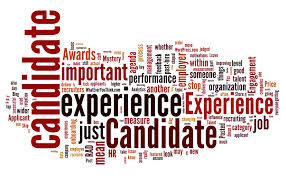Designing the Candidate Experience: What I Learnt From My First Job Interview
As I walked into the office, I spotted him almost immediately sitting quietly in the waiting room next to our reception area.
Aged somewhere between 25 and 30 years, he had that fresh-faced but anxious look about him that screamed ‘first job interview’ to all around. Opeoluwa, the charming associate consultant who manages our front desk didn’t seem to be around, so I asked him if anyone had attended to him. His quiet affirmation was barely perceptible over the hum of the air conditioner and CNN broadcast running quietly in the background.
“Here for an interview” I enquired? “Yes, I am” he again affirmed quietly. I wished him good luck and gave him a smile of encouragement as I headed towards my office.
I was still smiling as I sat down at my desk, for unknown to my young friend, he had far less reason to feel  anxious than he might have thought. In fact, the 45-minute interview he was about to undergo would probably be one of the friendliest, yet most revealing, interview sessions he would ever attend.
anxious than he might have thought. In fact, the 45-minute interview he was about to undergo would probably be one of the friendliest, yet most revealing, interview sessions he would ever attend.
To help you understand exactly how and why Human Edge interviews have been so carefully designed to bring out the best in candidates, I’m going to tell you a story.
From 1979 – 1980, I served my national youth service (or NYSC) with the now defunct Nigerian Petroleum Refining Company (NPRC) in Port-Harcourt, later to become the NNPC Port Harcourt Refinery.
To be honest, I had a great time in Port Harcourt. In the ’80s, life in the city was a young man’s dream and doing my national service at the refinery turned out to be quite exciting as well. I’d been posted to the company’s human resources department and the manager in charge put together an informal, 9-month internship program that saw me rotate through all the main HR functions. I learnt a lot and my stay there sparked off a love affair with all things HR that has lasted nearly 35 years.
Despite enjoying myself so much, I turned down an offer to stay on at the refinery in a permanent role at the end of my service year and returned home to Lagos. At the time, it seemed reasonable to assume that Lagos offered considerably broader options with regards to employment.
Shortly after my arrival back home, you can imagine my surprise when I received a letter inviting me to attend an interview with one of the big three oil majors operating in the country. To this day, I’m not sure how that invitation came about. I do know that I hadn’t yet started to look for work so I definitely hadn’t applied to this particular company. Perhaps a relative or family friend had spoken up on my behalf.
In any event, a week later I headed off to my first job interview, all scrubbed up and wearing my best suit. Sadly, there were no ‘selfies’ in those days, but I’m sure I must have been a sight.
My appointment was for 10 a.m and to make sure I wouldn’t be late, I decided to arrive a bit earlier. So, at 9 a.m on the dot I walked bravely up to the efficient – looking young woman at the reception desk on the ground floor of the company’s headquarters on Victoria Island and politely informed her that I was there for an interview. She looked me up and down for a moment and then motioned me to take a seat on one of the row of chairs in the reception area.
I watched the flow of human traffic in and out of the building for a while and tried to guess if there were any other candidates like myself there, but it was hard to tell who all the various visitors might be. I soon gave up on this and decided to read through the résumé I’d put together. There really wasn’t much to it, I thought to myself, but I wanted to be familiar with the information I’d put down.
As time passed, I became increasingly nervous. Remember, this was my first job interview! What if the receptionist had forgotten about me, I worried? By 9.45 a.m, I still hadn’t been called and all my efforts to make eye-contact with the young woman had failed. So, I went back to the front desk and reminded her of my appointment. “What did you say you are here for again?” she asked disinterestedly. “An interview with the HR manager,” I said and gave her the letter of invitation to read once more. “Where are you from?” she queried. “Erm, from my house” I answered. “Yes, but where are you from?” she impatiently asked once more. “From my house. Do you want the address?” I replied.
Whoops. Wrong answer, it seemed. Flashing an angry look my way, she dialed a number, and informed whoever was on the other end of the line that there was a candidate for interview before her who “refused to say where he’s from!”
To my horror, she then shoved the phone at me and said “Talk to the HR manager yourself.” The smirk on her face suggested that he or she would soon sort me out. It turned out to be a gentleman …and he did.
Five minutes later, with my ears still ringing from the barracking I got for being so uncooperative – especially as I was the one “looking for a job,” I found myself being ushered into the HR manager’s outer office, where a surprisingly considerate secretary asked me what I’d done to upset her boss quite so much.
“I’m sorry madam, but I honestly don’t know. Both the HR manager and the receptionist kept asking me where I was from, and I kept answering as truthfully as I could, from my house!” I explained. She  smiled at me in a knowing sort of way and proceeded to explain in a kindly voice “Ah, I see. What they meant was who referred you to our company?”
smiled at me in a knowing sort of way and proceeded to explain in a kindly voice “Ah, I see. What they meant was who referred you to our company?”
“Really? Why didn’t they just ask me that in plain English” I almost screamed.
Eventually, I got to spend about 10 minutes with the HR manager. I clearly hadn’t impressed him and it was quite obvious that he didn’t see much potential in me. He was kind enough to send me to have a chat with one of his assistant managers who, as it turns out, I recognized as having been a few years ahead of me at the University of Ibadan. Hopefully, he’d be a little more friendly. No such luck. Obviously my exploits of the day had traveled far within the company’s HR department and so, after yet another 5 minute tongue-lashing, I found myself back with the HR manager’s secretary. She gave me another apologetic sort of half-smile and urged me not to worry too much. Hopefully, things would turn out better than I thought.
“Perhaps she’s right,” I sighed to myself as I signed-out from the Visitor’s Book at the front desk, but then I noticed the receptionist somehow managing to both glare and smirk at me at the same time. There and then, I vowed that even if this was the last place on earth, I’d never work there.
So, there you have it. My first job interview turned out to be the proverbial ‘interview from hell.’
Fortunately, there’s a bit of a post-script to this story. Many years later, after I had become a senior HR manager myself with another oil major operating in the country, I had the pleasure of meeting that HR manager again. When I recounted my experience that day in his office, he appeared genuinely contrite, offered a profound apology and blamed the affair on a ‘bad day at the office.’ Well, by this time I’d had a few bad days at the office myself over the years, so I could empathize with his explanation. We shook hands and that was it.
Or was it?
I suspect many of my current views about the importance of creating a great candidate experience during the interviewing process have their roots in my personal experience. For example, I believe that more than ever business organizations are finding themselves competing for a dwindling pool of talent. Their problems are compounded by the fact that talented employees are still able to decide where they prefer to work, despite the unfavorable market conditions in most parts of the world at the moment. In my experience, many employers are still finding it hard to come to terms with the power that prospective talented employees may wield.
I think this is unfortunate, not the least because the interview process is probably best viewed as a mechanism for employers and prospective employees alike to decide if a given job opportunity represents a good fit for both parties. Designing a great candidate experience into that process can help tip the balance in favor of employers as they seek to secure the services of much sought after organizational talent.
At Human Edge, we’ve tried to turn this recognition into concrete action by assembling a team of consultants and tasking them with the design and monitoring of what we call the ‘Branded Candidate Experience’ at the firm. Their goal? To make sure candidates attending interviews with the firm have a great experience while doing so.
In case you’re wondering, the ‘Branded Candidate Experience’ isn’t just an exercise in employment branding or corporate P.R. In his fascinating new book, ‘The Best Place to Work: The Art and Science of Creating an Extraordinary Workplace, author Ron Friedman, PhD points out that the first few minutes of an exchange can have a dramatic impact on the subsequent development of relationships. By paying careful attention to those first ‘Moments of Truth’ in the interviewing process we’ve discovered that even candidates who eventually aren’t successful in getting their dream jobs enjoy the experience so much, that they often go on to become some of our most effective brand champions.
From personal experience, I’d also add that first impressions are usually lasting ones. Remember, the events described in my story occurred nearly 35 years ago but I still recall them quite vividly. Furthermore, the (negative) impressions I formed of the company in question have hardly changed since that time. Something to think about at a time when the concept of ’employer branding’ is receiving growing attention.
Today, I’m more convinced than ever that a great candidate experience doesn’t just happen by chance. Rather, it’s the result of careful planning and disciplined execution. Done properly, it can produce a truly win-win outcome. Employers ignore this important tool at their own peril.
Designing the Candidate Experience: What I Learnt From My First Job Interview by Folarin Longe


